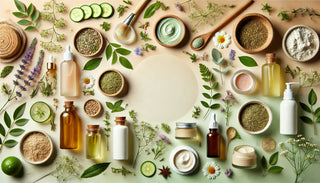In today’s beauty landscape, natural skincare has emerged as a trusted alternative to synthetic products. With increasing concerns about harmful chemicals and a growing desire for eco-friendly solutions, more people are turning to nature for their skincare needs. This comprehensive guide will explore the benefits of natural skincare, explain what to look for in natural products, and share best practices to help you build a routine that supports both your skin’s health and the environment.
Why Choose Natural Skincare?
1. Gentle on Your Skin
Natural ingredients are often less irritating than their synthetic counterparts. They work in harmony with your skin’s natural processes, reducing the risk of adverse reactions and sensitivities. Ingredients like aloe vera, chamomile, and calendula provide soothing benefits that help calm irritated or inflamed skin.
2. Eco-Friendly and Sustainable
Many natural skincare brands commit to sustainable sourcing and eco-friendly packaging. Choosing products made with responsibly harvested ingredients and recyclable materials not only benefits your skin but also helps protect the planet. This environmentally conscious approach reduces chemical waste and minimizes the ecological footprint of your beauty routine.
3. Rich in Nutrients and Antioxidants
Natural skincare products often harness the power of botanical extracts, vitamins, and antioxidants. Ingredients such as green tea, rosehip oil, and vitamin E help protect the skin against free radical damage while promoting a healthy, radiant complexion.
4. Transparency and Ethical Production
Natural skincare brands tend to prioritize ingredient transparency and ethical practices. Many companies openly share information about the sourcing, formulation, and testing of their products, allowing consumers to make informed decisions about what they put on their skin.
What to Look for in Natural Skincare Products
When choosing natural skincare products, consider the following tips to ensure you’re getting high-quality formulations:
1. Ingredient Lists
-
Short and Simple: Natural products usually have shorter ingredient lists. Look for recognizable, plant-based ingredients rather than long strings of chemical names.
-
Avoid Harsh Additives: Even in natural products, be cautious of ingredients that might cause irritation or allergies. Essential oils, for example, can be beneficial but may require dilution for sensitive skin.
2. Certifications and Labels
-
Organic and Natural Certifications: Look for products certified by organizations like USDA Organic, Ecocert, or COSMOS. These certifications help verify that the ingredients are grown and processed according to strict standards.
-
Cruelty-Free and Vegan: For those who are environmentally and ethically conscious, certifications such as Leaping Bunny or Vegan Society can be key indicators of a brand’s values.
3. Packaging
-
Eco-Friendly Options: Natural skincare brands often use recyclable or biodegradable packaging. Consider the packaging materials as part of your commitment to sustainable beauty.
4. Brand Transparency
-
Research the Brand: Look for brands that are open about their sourcing, production processes, and testing practices. A transparent brand is more likely to be trustworthy and committed to genuine natural formulations.
Best Practices for Natural Skincare
Transitioning to natural skincare can be a rewarding experience when done thoughtfully. Here are some best practices to help you build an effective natural skincare routine:
1. Know Your Skin Type
Understanding your skin is the foundation of any skincare routine. Whether you have oily, dry, combination, or sensitive skin, choose natural products that cater specifically to your skin type. For example:
-
Dry Skin: Look for nourishing oils like argan or jojoba, and hydrating ingredients such as aloe vera or hyaluronic acid.
-
Oily Skin: Opt for lightweight, non-comedogenic formulas that help balance oil production without clogging pores.
2. Introduce Products Gradually
Switching to natural skincare can sometimes lead to an adjustment period for your skin. Introduce one new product at a time so you can monitor how your skin reacts. This approach will help you identify any sensitivities and ensure that each product works harmoniously with your skin.
3. Patch Test New Products
Before fully incorporating a new product into your routine, perform a patch test. Apply a small amount on a discreet area of your skin and wait 24–48 hours to check for any adverse reactions. This simple step can help prevent unexpected breakouts or irritation.
4. Keep It Simple
A minimalistic approach can be highly effective. Focus on a few core products—a gentle cleanser, a hydrating moisturizer, and a targeted treatment—to address your skin’s needs. Sometimes less is more when it comes to natural ingredients.
5. Embrace Consistency
Natural skincare works best when used consistently. While the results may not be as immediate as those from highly active synthetic products, a steady, dedicated routine can lead to long-term improvements in skin health and appearance.
Tips for Enhancing Your Natural Skincare Routine
-
Stay Informed: Follow trusted natural beauty blogs, watch educational videos, and read ingredient labels carefully. Staying informed will help you navigate the ever-evolving world of natural skincare.
-
DIY Remedies: Consider incorporating DIY treatments using ingredients like honey, oatmeal, or avocado. Many natural remedies have been passed down through generations and can complement your commercial products.
-
Consult a Professional: If you have persistent skin issues or concerns, consult a dermatologist who understands natural skincare. They can provide personalized advice tailored to your skin’s unique needs.
-
Mind Your Diet: Natural skincare goes beyond topical applications. A balanced diet rich in fruits, vegetables, and healthy fats can improve skin health from the inside out.
Final Thoughts
The ultimate guide to natural skincare emphasizes that healthy, radiant skin can be achieved without relying on harsh chemicals. By choosing natural products, you not only nurture your skin but also contribute to a more sustainable and ethical beauty industry. Remember, natural skincare is a journey—one that involves learning about your skin, making informed choices, and embracing a holistic approach to beauty.
What natural skincare practices have transformed your routine? Share your tips and favorite products in the comments below and join the conversation on creating a more beautiful and sustainable future.
Embrace the power of nature, and let your skincare routine be a reflection of your commitment to both personal wellness and environmental stewardship.

